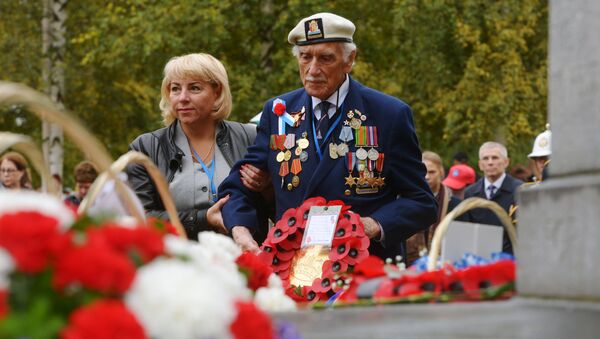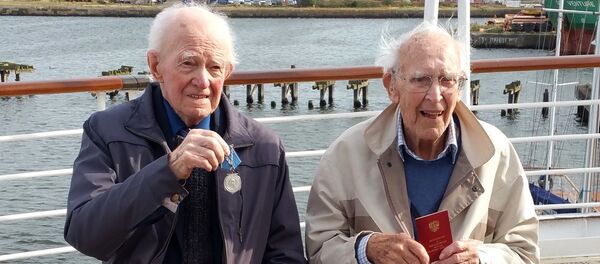The Lend-Lease Program was designed by US President Franklin D. Roosevelt's administration to support the war effort of nations and other belligerents involved in the military confrontation with the Axis powers during World War II. As part of this policy, naval convoys delivered military supplies, vehicles, industrial furnaces, ammunition and food from the North Atlantic (primarily, Iceland, Scotland and the north of England), and the northern Russian cities of Murmansk and Arkhangelsk.
Many naval servicemen participating in the convoy deliveries lost their lives due to German U-boat and Luftwaffe activity in the region, but the war effort made dauntless allies of the nations of the Free World and the Comintern, as exemplified by the courage, prowess and determination of this joint endeavor.
Among the events underway in Arkhangelsk are a conference dedicated to Land-Lease and Arctic Convoys, a set of commemorative ceremonies honoring the memory of those who lost their lives in the waters of the North Sea and the Arctic delivering supplies to facilitate the Soviet struggle, a Dervish Football Stars game, as well as several live music events.
"The Arctic Convoys played a critical role in securing victory in WWII. This year marks the 75th anniversary of their first mission in 1941. Together with Russia, and our other wartime allies, we honor those who gave their lives in the struggle against Nazism," Laurie Bristow, the UK's ambassador to Russia, said.
Over 3,000 American, Russian and British sailors died while conducting the convoy deliveries between 1941 and 1945. The British Prime Minister at the time, Sir Winston Churchill, famously referred to the Arctic Convoys as "the worst journey in the world."
The path, pioneered by the Dervish Convoy, provided Russia with about 17.5 mln tons of supplies. These helped boost the Red Army's operational potential, restore the USSR's industrial capacity after it endured substantial territorial losses to the Germans in the first months following Hitler's notorious Operation Barbarossa invasion of the Soviet Union, and, most importantly, decrease the rates of starvation among the civil population where possible. Some 94 percent of the Lend-Lease supplies originated in the US, allowing the American economy to re-emerge from the Great Depression due to a massive surplus in foreign trade.
During 1941-1945, the US shipped Russia an $11 bln worth of goods, including some 400,000 jeeps and trucks; 12,000 armored vehicles (including 7,000 tanks), 11,400 airplanes, and 1.75 million tons of food.
For their part, the UK delivered some 7,000 aircraft, 5,218 tanks, 4,020 heavy-duty vehicles, as well as radar and sonar equipment, motorcycles, airplane engines, large-caliber guns and 15 mln pairs of boots to Russia between June 1941 and May 1945.
The goods and provisions were paid for in gold and financed with loans. The USSR also shipped raw materials to the US, minerals and industrial machinery, as well as fuel and servicing for Allied aircraft and naval vessels.
The Dervish convoy consisted of six merchant vessels, carrying raw materials and 15 Hawker Hurricane fighter planes — the British make known as "the plane that won the Battle of England" in 1940. An experimental venture initially — as few Allied leaders had believed such an operation as Arctic Convoy would prove feasible — the Dervish Convoy paved the trail for more wartime deliveries of goods to Russia.
Ultimately, the Axis war effort failed and the world subsequently entering the murkier waters of the Cold War. However, the Arctic Convoys remain not only a proper example of a successful military campaign, but also emphasize the positive impact of intensified international trade, which helped both the US and Russia overcome both the Great Depression, on the one hand, and desolation and ruin, on the other.





